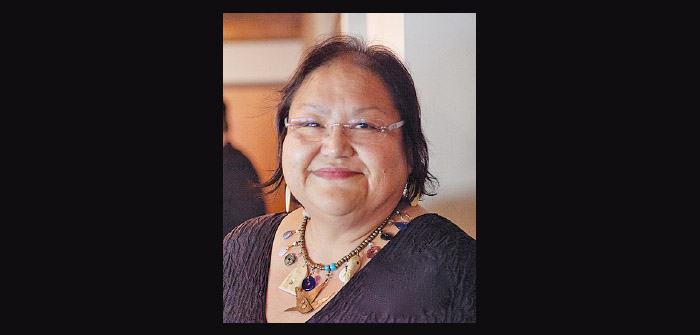(Elizabeth Woody)
For the Confederated Tribes of Warm Springs and for Native Americans in general, the Museum At Warm Springs (MAWS), “the first tribal museum in the state of Oregon,” proudly stands as an affirmative response to a troubling question: “Can this nation’s indigenous peoples take any meaningful steps on their own initiative, under their own control to halt the erosion of their traditions, the dispersal of their sacred artifacts, the loss of their very identity as a culture” (museumatwarmsprings.org/the-museum-story)? MAWS 25th anniversary in 2018 testifies to the clarity of this affirmation, and its new Executive Director Elizabeth Woody, who took her position in December of that year, further asserts its veracity.
The first Native American to be named Oregon’s Poet Laureate, published author, visual artist, educator, scholar, community leader and much more, Elizabeth Woody is an enrolled member of the Confederated Tribes of Warm Springs, of Yakama Nation descent, and born for the Tódích’íinii (Bitter Water clan) of the Navajo Nation. She holds an Executive Masters of Public Administration degree from Portland State University and a Bachelor of Arts degree in Humanities from Evergreen State College, WA, and studied creative writing and two-dimensional arts at the Institute of American Indian Arts in Sante Fe. Elizabeth has served on important boards, advisory councils and committees, been a Program Officer for the Meyer Memorial Trust, a Program Coordinator for K-12 Education, the Director of an Indigenous Leadership Program, a Professor of Creative Writing, a Studio Manager for Lillian Pitt Masks, and an Independent Contractor-Writer. All of these incredible accomplishments and service-oriented positions, somehow managed in a single lifetime that has much more to offer, uniquely positions Executive Director Woody to further the Museum at Warm Springs’ mission: “to preserve, advance and share the knowledge of the cultural, traditional and artistic heritage of The Confederated Tribes of Warm Springs” (museumatwarmsprings.org).
Moving back in time to her childhood, Woody constantly explored her natural surroundings. An obsessive drawer, she made art incessantly and honed her observational skills by recording her formative experiences as a scientist would. In contrast to her commendable adult track record, Elizabeth was actually expelled from high school for truancy, even though she was making photographs in the photo lab, unbeknownst to the powers that be. Her vice principal noted she didn’t run with the crowd, and in the yearbooks she was often one of those “not pictured.” Tests indicated Elizabeth would be well suited for “repetitive handwork.”
Such misperceptions of who Elizabeth was and could be are symptomatic of the plight of Native Americans generally speaking and particularly within the American education system. “We’re stigmatized as being a population of under-achievers,” Woody stated during our insightful phone conversation. “Indian students consistently don’t thrive; every year they fall behind,” she acknowledged, but whose fault is this, she asks? Imagine a history of trauma being passed down through generations due to atrocities of subjugation, colonization, dispossession of land, and war, and the answer becomes both clearer and more complicated.
Major components of Woody’s approach towards education and the work she sees herself doing at MAWS can be traced to her profound appreciation for nature as well as to conceptions of identity, such as those cast upon her and her people. “There are so many benefits of educating people about the beauty of Native American culture,” she asserts, adding that people need to move beyond the stereotypical view that “we’re savages and Pocahontas princesses.” Elizabeth further argues that “many of humanity’s greatest civilizations were found in this hemisphere. There is a very important lesson in this: The natural law of our humanity is best expressed through a deep connection to the land. In this respect, we must manage it in a way that benefits all life, not just human life.”
As Executive Director of MAWS, Woody’s primary vehicle for accomplishing her mission and that of the museum can be found in exhibitions, lectures and accompanying discussions that raise important questions about and shed much needed understanding upon complex issues. This June 27 through September 28, for example, the museum presents “RESILIENCE: The Boarding School Experience of Warm Springs and beyond,” which explores both the negative and positive impacts such schools had and have on Native American children. Later this year on August 17th, MAWS presents its Huckleberry Harvest and Honoring Dinner, which will take place at the High Desert Museum in Bend. This yearly event represents an important fundraiser for MAWS while also particularly recognizing the extraordinary achievements of Howard Arnett who has served as attorney for the Confederated Tribes of Oregon with Karnopp Petersen, LLP since 1980 and Dr. Virginia Beavert of the Yakama Nation, a Linguist/Scholar and Professor at the University of Oregon whose most recent book is The Gift of Knowledge / Ttnúwit Átawish Nch’inch’imamí: Reflections on Sahaptin Ways.
Such exhibitions and events beautifully represent the sentiment Elizabeth Woody conveys about her new position as executive director: “the opportunity to keep learning.” After years of living in New Mexico and Portland and returning to Warm Springs to care for her mother during her final days after being diagnosed with aggressive metastatic cancer, Woody’s uncle expressed the feeling that so many of us thankful for her presence here share: “I’m so grateful you’re home, Lizzy. We need you!”

